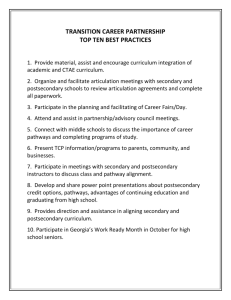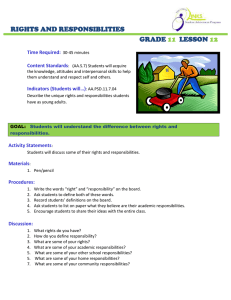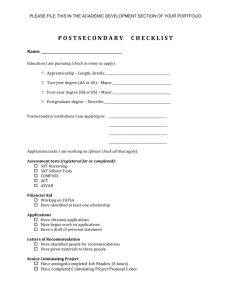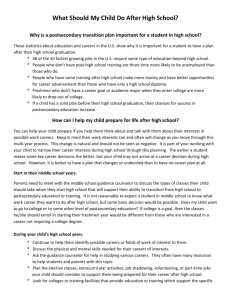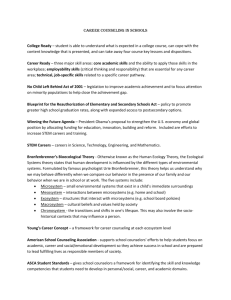WELCOME Counseling for Careers Lynn Anderson Director, Counseling for Careers
advertisement
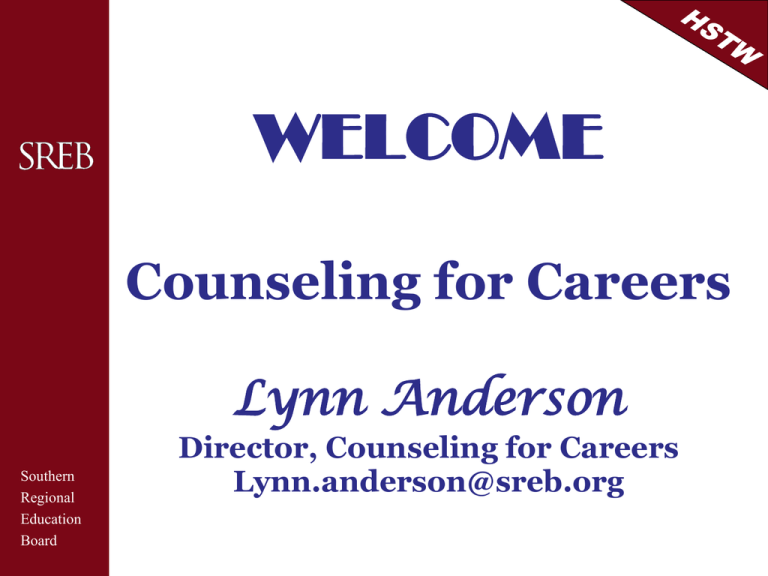
WELCOME Counseling for Careers Lynn Anderson Southern Regional Education Board Director, Counseling for Careers Lynn.anderson@sreb.org Counseling for Careers Southern Regional Education Board Counseling for Careers is an organized, structured effort that connects students to future education and career goals; while providing a set of learning experiences that enables students to create a meaningful vision for a successful future and the program of study for achieving that vision. Here’s what we’re dealing with…. Southern Regional Education Board 2013-2014 Freshmen 65% will be employed in careers that do not exist today. By 2020, 97% of all careers in this country will require some type of postsecondary education/training 67% of students who drop out of high school, decided before Christmas their freshman year to drop out U.S. Bureau of Labor and Statistics National Drop Out Prevention Report 2010 By the time today’s students graduate from high school they will have: Marc Prensky, 2006 Spent over 10,000 hours playing video games Sent and received over 200,000 e-mails and instant messages Spent over 10,000 hours talking on cell phones Spent over 20,000 hours watching TV Seen over 500,000 commercials Spent, at most, 5,000 hours reading books. Southern Regional Education Board # 542 What Counselors Need to Know 4 Time for a REALITY CHECK 80% of tenth graders aspire to go to college. For every 100 ninth graders… 68 graduate from HS on time 40 immediately enroll in college 27 of the 40 are still enrolled sophmore year 18 graduate from college in six years Southern Regional Education Board What are we lacking???????????????? Connecting Students to a Goal Beyond High School Graduation Through Southern Regional Education Board 1. Assignments and lessons where students discover the connection between the classroom and a successful future. 2. A structured, standards based, academic/personal/career advisement 3. A transition initiative 4. Career academies/career pathways/programs of study 5. Individual education and career plans for every student 6. Education and career awareness and exploration 7. Increased parent and community partnerships In no other industrialized country has the transition from school to career been left so much to chance as in the United States of America. Southern Regional Education Board 1. Assignments and lessons where students discover the connection between the classroom and a successful future. Those age old questions………. “Why do I have to take this?” Southern Regional Education Board “When am I ever going to use this?” Advisement 1. A systemic approach to providing ALL students with the knowledge and skills to make decisions about his/her education and career 2. A process to aid students in developing selfawareness, education and career awareness, and decision-making skills Southern Regional Education Board 3. A process to help each student improve his/her chances for success Advisement is time for…… Southern Regional Education Board Building relationships Self-discovery Trouble shooting Team building Education and career investigation and exploration Connection with parents/guardians Enhanced academics Post-secondary exploration/planning Advisement is NOT!!!! Southern Regional Education Board Homeroom Study hall Wasted time Unorganized Unplanned Time for announcements Time for pep rallies Advisement time is SACRED!! Scheduling Minimum of one day weekly For 30 to 45 minutes Not on Monday or Friday Not first thing or last thing in the day Preferably between second & third (before lunch) Create an alternate bell schedule Southern Regional Education Board (same # of minutes off every period) Advisement Fundamentals Same number of advisors for each grade level (# faculty divided by 4) Group size preferably, 12-20 students (total # of students per grade level divided by # of advisors) Students are randomly grouped by grade level (ALL students) Southern Regional Education Board Accountability for advisors and students is mandatory. Advisement must be included in an educators’ service review. Advisement IS!!!!!!!!!! NOT doing the school counselor’s job Is all about building relationships!!!! IT IS OUR JOB!!!!!!!!!!! Southern Regional Education Board A Transition Initiative Elementary to Middle Middle to High School High School to Post Secondary Post Secondary to Career Southern Regional Education Board Transition Ideas Southern Regional Education Board A stand alone course Integrated into required coursework Summer programs/Boot camp Integrated into Advisement All of the above Others………. Transition Efforts MUST Helps students create a vision of a successful future. Provide students with the knowledge, skills, practice, and planning needed to successfully navigate the next steps in their education and future. Southern Regional Education Board Equips students with the necessary tools for a smooth transition into the future. Resources “Skills for a Lifetime” “Career Choices” “Teenagers Preparing for the Real World” “Financial Literacy” “Career Readiness for Teens” “LINKS” Junior Achievement www.ja.org Southern Regional Education Board Southern Regional Education Board COLLEGE CAREER MAJOR These Decisions Must Be Made, BUT in What Order? Career Clusters/Career Pathways High schools organize around career clusters/career pathways to prepare students to meet the demands of postsecondary education and the expectations of employers. Southern Regional Education Board Teacher/advisers and school counselors use career clusters/career pathways to help students explore options for the future. Pathways Southern Regional Education Board Prepare students for the full range of postsecondary opportunity – pathways eliminate sorting and tracking high school students in ways that limit options after high school. Produce high levels of academic and technical achievement, high school completion, postsecondary transition and attainment of a formal postsecondary credential. Pathways of Study Ensures that: Southern Regional Education Board Integration occurs between academic and occupational learning; Transitions are established between secondary schools and postsecondary institutions; Coursework is focused and sequenced; Students are prepared for employment in a broad career cluster; and Students receive a skill credential. 22 Why A Pathway Program of Study? Southern Regional Education Board Provides students a clear format to show: qualifications for college and career relevance of academic coursework Connections between student interest and high skill/high wage career options options for range of postsecondary education opportunities •Licenses, certificates, apprenticeships and degrees 23 Reality Check OVER 5 Million Jobs Waiting to be Filled! 3.5 million Computer/Information Technology (average salary over $100K annually) 800,000 Skilled Trades ($45-$95k) 200,000 Manufacturing/Facilities ($35-$85k) 300,000 Transportation ($47-$97k) U.S Department of Labor, Bureau of Labor Statistics Southern Regional Education Board All require post secondary education and training Are we introducing our students to these careers? # 542 What Counselors Need to Know 24 Skilled Trades Southern Regional Education Board Operating engineer (Heavy equipment operator) Pipefitter Plumber Electrician Automotive technician Automotive environmental safety technician Ironworker Insulator Carpenter Pipeline construction specialist Pipeline safety technician Utility maintenance operator # 542 What Counselors Need to Know 25 Manufacturing and Facilities Careers Southern Regional Education Board Global Logistics Manager Graphic Design Specialist Quality Control Technician Facilities Maintenance Technician Management Specialist Health and Safety Manager Energy Conservation Specialist Fiber Optic Technician Production Operations Manager Compliance Specialist Software Developer Web Design Specialist # 542 What Counselors Need to Know 26 Transportation Careers Southern Regional Education Board Environmental Specialist Logistics Technician Hazardous Materials Specialist Diesel Technician Aircraft Maintenance Technician Import/Export Coordinator Owner Operator Teams CDL Drivers Pilots Railroad Engineers Air Courier Railroad Safety Inspectors Transportation Analyst # 542 What Counselors Need to Know 27 U. S. Department of Labor Careers in Highest Demand Southern Regional Education Board Career Education Median Salary Manufacturing technician Certificate $64,590 Automotive technician Certificate $58,560 EMT Certificate $41,180 Medical equipment repair Certificate $61,480 Civil drafters Certificate $55,940 Tower crane operator Apprenticeship $86,170 Plumber/pipefitter Apprenticeship $61,830 Electrician Apprenticeship $52,910 Diesel engine specialist Apprenticeship $64,360 Welders/cutters/blazers Apprenticeship $47,920 Aircraft mechanic Apprenticeship $52,010 # 542 What Counselors Need to Know 28 ACT Study: The math and reading skills required for electricians, construction workers, upholsterers, and plumbers are the same as what’s necessary to succeed in first-year college courses! ACT, Readiness for College and Readiness for Work: Same or Different, Iowa City, IA. 2006 Southern Regional Education Board and those skills are also increasingly important OUTSIDE of jobs! # 542 What Counselors Need to Know 29 Individual Graduation Plans (PEP) Southern Regional Education Board 1. Include rigorous academic core subjects and focused course work in mathematics and science or in humanities, fine arts, and foreign language or sequenced career pathway coursework; 2. Incorporate provisions of a student’s Individualized Education Program (IEP), where applicable; 3. Align educational and broad career goals and the student’s course of study; 4. Be based on the student’s selected academic and career focus area as approved by the student’s parent or guardian; 5. Include experience-based career oriented learning experiences, which may include but not be limited to, internships, apprenticeships, mentoring, cooperative education, and service learning; 6. Include opportunities for postsecondary studies through articulation, dual enrollment, and joint enrollment; 7. Allow flexibility to change the course of study but remain sufficiently structured to meet graduation requirements and qualify the student for admission to postsecondary education; 8. Be approved by the student and the student’s parent or guardian with guidance from the student’s school counselor or teacher advisor; 9. Be reviewed and revised, if appropriate, upon approval by the student and the student’s parent or guardian with guidance from the student’s school counselor or teacher advisor. What Are The Right Courses for Students? Southern Regional Education Board Pathway Program of Study should be based on: Interest Student career & educational goals Individual needs and status of student Postsecondary opportunity options Genuine career opportunities Parent/guardian & advisor input Connection among achievement, enrollment, and advisement 31 Course Selection Must be based on the student’s interest and ability! What are we doing to gather this information from our students, and when? Southern Regional Education Board Focus of high school courses must: Expect more than minimum requirements Plan for dual preparation of post-secondary and careers Be planned with an advisor and parents Connect with student interest Consider a different schedule load for at-risk 9th graders • What if ____________was postponed until 10th-12th grade? 32 Course Selection Southern Regional Education Board Faculty must be involved (Counselors can’t do it all) Faculty must have input into course selection Must be based on student’s interests and goals Must be reviewed with parents at least yearly Education and Career Exploration Speakers Resource Bank (Start with finding out what your parents do.) Mentoring and/or Tutoring Student Activities/Occupational Outlook Handbook (K-12) Career Prep Clubs Education and Career Exploration Events Southern Regional Education Board (Job Shadowing, Internships, Work-based Learning, Career Expos, etc.) Business and Industry Partnerships Parental Involvement Southern Regional Education Board Why do you think parents and the community fail to get involved with schools? They don’t feel welcome. They don’t feel qualified. There’s a lack of communication. Schools aren’t flexible. Southern Regional Education Board Meaningful methods of participation aren’t recommended by schools. “It’s not my job!” Parents should be invited to at least one meeting a year to review their child’s program of study and course selection for next year. Southern Regional Education Board Let’s think about some easy strategies for improving parental support. Southern Regional Education Board Reward students for accurate parental contact information Contact parents at least once per semester Contact parents with good news Varying days/times for parent conferences ( i.e. 7am-11am; noon-3pm; 4pm-8pm) Providing child care, food, other incentives (this can easily be done via community service hours, and your CATE programs) Celebrate, making coming to the school beneficial, easy, and positive! Possibly varying the mechanism for parent conferences, do they have to be at the school? (Can we do this via technology, if all else fails?!) How Do You Get Parents to Attend Annual Student-Adviser-Parent Meetings? Southern Regional Education Board “What’s in it for me?” Have an appointment Make the appointment meaningful Make the time convenient Student-led Conferences Parent Involvement Plan What are we doing now? Is it working? In what ways would we like to use our parents and/or community partners? What would we like to try? By when? What resources or actions are needed? Southern Regional Education Board Let’s look at where we are…… Gap analysis rubric Review and check off what is already happening at some level Where do we need to tweet in an effort to make this strategy GREAT!! What would we like to add? How to begin planning Southern Regional Education Board The path from the classroom to the work place is neither well marked nor easily navigated! Education is the only industry in which our CUSTOMERS become our PRODUCTS! Southern Regional Education Board If tomorrow never comes will you be satisfied with the contribution you made today?! Southern Regional Education Board for your time and hard work today!
